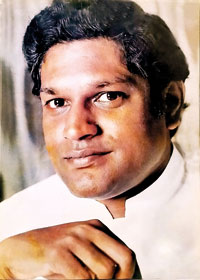Sunday Times 2
My recollections of Upali Wijewardene
View(s):My recollections of Upali Wijewardene – a visionary entrepreneur who made a profound impact on Sri Lanka’s journey toward development and prosperity – are etched in admiration. He stood apart from his peers, leaving a legacy that continues to inspire. This is how I remember him.
Born in 1938 into the prominent Wijewardene family, Upali was a nephew of former Sri Lanka President J R Jayewardene. He was educated at Royal College, Colombo, and later pursued his higher studies in England. Upon returning to his homeland, he joined Lever Brothers as an executive. However, his entrepreneurial spirit couldn’t be contained within the corporate walls for long.
Upali soon teamed up with his close friend and partner, Chandrasiri Murugaiah, the son of the Head Kangani of Delta Estate in Pussellawa. Their first venture was ‘Delta Toffee’ – a sweet produced on an industrial scale at a time when confectionery in Sri Lanka was mostly handmade. When I had the good fortune of meeting Upali, he recounted how he made the first batch of Delta Toffee in his garage, using a large vessel, with Murugaiah by his side.
As an entrepreneur, Upali invested most of his available funds into a nationwide advertising campaign. The gamble paid off. This success paved the way for the birth of the Upali Group of Companies. Around this period, the Upali portable radio was launched – it became my companion and sole form of entertainment during my career as a young Plantation Assistant Superintendent in 1964. The iconic Upali Transistor, a rectangular box resting on four short supports and fitted with two knobs, offered comfort and connection in the isolation of plantation life. In the early 1980s when Television was introduced to Sri Lanka, his company was a leading supplier of the brand UNIC Television sets to the population.
Upali pioneered the domestic airline which flourished and made travel convenient within the country using a Cessna to commence the original flights to Jaffna from Colombo. He later expanded the flights to other parts of the country.
In 1974, while working at Nakiadeniya Group, a rubber plantation, and pioneering the oil palm industry in Sri Lanka, I had the opportunity to work for Upali. In 1973, amid the nationalisation of Sri Lanka’s plantations – with no compensation offered by the Government – he acquired controlling shares of the British-owned Grand Central Company at a nominal price. Of the 33,000 acres Grand Central held in Sri Lanka, 7,300 acres belonged to Nakiadeniya Group, in Galle District.
Grand Central, as a foreign-owned company, was shielded from the initial wave of nationalisation, which restricted ownership to 50 acres per person, initially targeting the rupee enterprises. Thereafter, in 1975, the government extended nationalisation to foreign companies – Grand Central was not affected due to its local registration of shares between the two stages of nationalisation. Through this strategic move, Upali became the only individual to legally control over 50 acres of land in Sri Lanka.
His bold plan was to convert the entire Nakiadeniya Group into an oil palm plantation at a rate of 1,000 acres per year. Entrusting me with this task, I was able to develop 1,300 acres before the government used Parliamentary powers to initially manage and later acquire Grand Central in 1981, with retrospective effect from 1975. His foresight in the future of oil palm in Sri Lanka has resulted in the present acreage being expanded to 30,000 acres. Following the nationalisation of Grand Central, Upali offered me a position as a plantation manager in one of his plantations in Malaysia.
One of his earliest landmark ventures was assembling Fiat cars at Maharagama during a period of import restrictions to Sri Lanka. Upali imported components of the car and assembled them locally, accepting advance deposits of Rs 64,000 per customer – with a promise to deliver a brand-new vehicle. True to his word, the venture was a success.
A frequent visitor to Singapore and Malaysia, Upali saw the potential in the cocoa and oil palm industry. Leveraging the profits from his earlier ventures, he purchased Blenheim Estate in Teluk Intan, Malaysia, a cocoa and coconut plantation approximately 100 miles from Kuala Lumpur. At the time of purchase, cocoa sold at about MYR 1,000 per ton and the price soon surged fivefold.This success enabled his next move, the ownership of Kandos Chocolate Factory in Shah Alam, near Kuala Lumpur.
At the peak of his entrepreneurial journey, Upali flew regularly to London in his private Lear Jet to attend events like horse races, where his own horses competed. I vividly remember being invited to dinner at his residence, Cocoa Hill on my arrival in Malaysia to take up duties on his Plantation. That evening, he showed a clip of his horse winning a race and accepting the trophy with his wife, Lakmini. He shared stories from his youth, including the making of Delta Toffee, and remarked-“I studied for 20 years, earned for the next 20, and then entered politics.”
Tragically, his life was cut short. On February 13, 1983, while I was managing his property Sungai Koya Plantation in Lahad Datu, Sabah, Upali’s Lear Jet returned to Kuala Lumpur from Singapore after a routine service. The plane disappeared with no trace 15 minutes after taking off from Kuala Lumpur with Upali on board. He was just 45.
- Rex Perera

